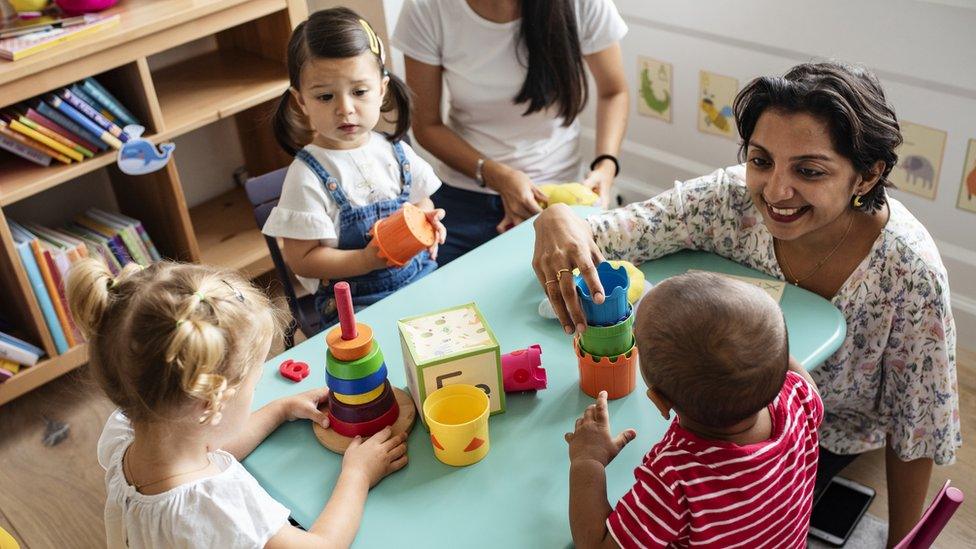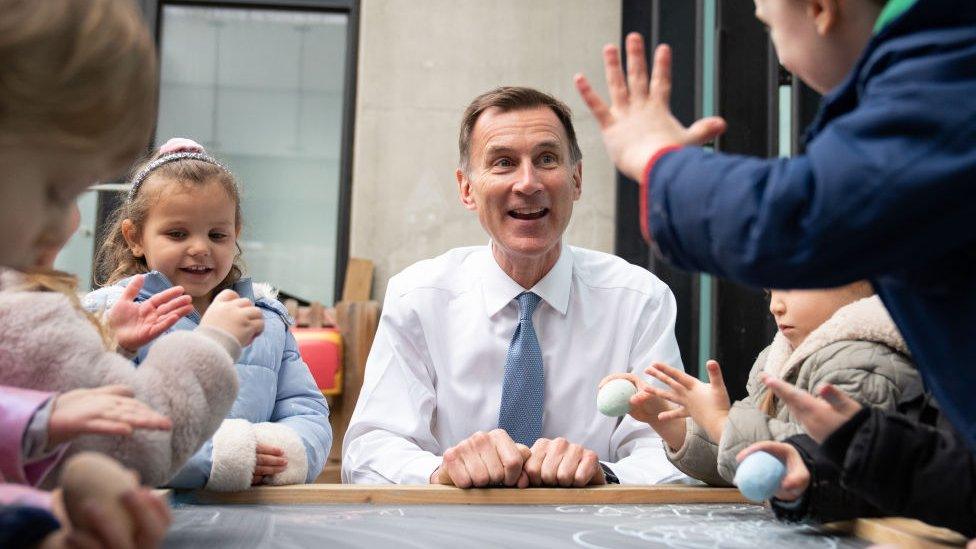Nursery closures threaten free childcare pledge, sector warns
- Published

The number of nurseries in England fell by more than 400 last year, with the sector blaming "chronic underfunding" and rising costs.
The National Day Nurseries Association (NDNA) said the figures raised "serious questions" about whether there would be enough places to deliver the promised expansion of free childcare.
It said the data should be a "wake-up call" for the government.
The government said it was increasing the amount paid to childcare providers.
In the year to the end of March the number of nurseries and pre-schools in England fell from 27,291 to 26,884, while overall there were 3,512 fewer places, according to the latest figures from watchdog Ofsted, external.
Including childminders, the number of childcare places fell by 24,521.
There is already a shortage of nursery places. Nearly half of areas do not have enough available spaces for children under two, and a third do not have enough space for three and four-year-olds, according to a report earlier this year.
In March's Budget, the government announced the current scheme offering some families in England 30 free hours of childcare per week for three and four-year-olds would be extended to cover younger children.
The changes will be phased in, starting with 15 hours free childcare per week for eligible parents from April next year.
From September 2024 eligible children between nine months and two years will get 15 hours and from September 2025 eligible children between nine months and three years will get 30 hours.
However, nurseries say the amount the government pays them for free childcare hours does not cover their costs.
The government said in the Budget that the hourly rate it pays for funded places for two-year-olds will rise by 30% from the current national average rate. For three and four-year-olds, it will rise by 4%.
But Jonathan Broadbery, director of policy and communications at the NDNA, said: "The increase in funding rates in September will clearly be too late for many nurseries, resulting in children's care and education being disrupted."
'Devastating'
The NDNA said nurseries were also facing increased costs including for staff wages, food and business rates.
Jo Morris, who runs two nurseries in Swindon, Wiltshire, said her costs for things like food, nappies and cleaning supplies had gone up around 20% over the past year. She said her nurseries had also seen increased staffing costs due to rises in the minimum wage.
While she gets government funding for free childcare hours she said this did not cover the cost of delivering these places. Instead, she said she was forced to charge more for children outside of the free childcare offer.
However, with the plans to expand free hours to more children Ms Morris said this would become more difficult.
She told the BBC that unless government funding covered the cost of delivering free hours "nurseries like ours just won't survive".
"Personally for my nursery, the choice would have to be to close the smaller one, which would be devastating," she said.
"But ultimately, if we can't cover the cost of doing it, then we can't continue doing it."
A Department for Education spokeswoman said:"We recognise that there are some local challenges in the availability of childcare places."
However, she said the picture was "broadly positive", with the number of childcare places decreasing by only 2% last year.
"We are confident in the strength of our childcare market and the delivery of supporting more working parents of children over the age nine 9 months with free 30 hours of childcare."

Are you a parent who has been affected by a nursery closure or the shortage of nursery places? Share your experiences by emailing haveyoursay@bbc.co.uk, external.
Please include a contact number if you are willing to speak to a BBC journalist. You can also get in touch in the following ways:
WhatsApp: +44 7756 165803
Tweet: @BBC_HaveYourSay, external
Please read our terms & conditions and privacy policy
If you are reading this page and can't see the form you will need to visit the mobile version of the BBC website to submit your question or comment or you can email us at HaveYourSay@bbc.co.uk, external. Please include your name, age and location with any submission.
Related topics
- Published30 January 2023

- Published15 August 2022

- Published18 March 2023

